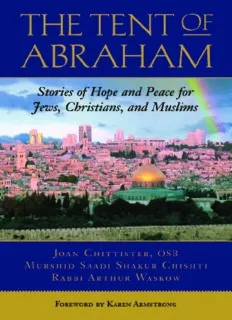
The Tent of Abraham: Stories of Hope and Peace for Jews, Christians, and Muslims PDF
Preview The Tent of Abraham: Stories of Hope and Peace for Jews, Christians, and Muslims
THE TENT OF — ABRAHAM Also by Joan Chittister, OSB Called to Question: a spiritual memoir Scarred by Struggle, Transformed by Hope The Friendship of Women The Hidden Tradition of the Bible Also by Neil Douglas-Klotz (Saadi Shakur Chishti) The Genesis Meditations A Shared Practice of Peace for Christians, Jews, and Muslims The Sufi Book of Life 99 Pathways of the Heart for the Modern Dervish Blessings of the Cosmos Benedictions from the Aramaic Words of Jesus Also by Arthur Waskow Godwrestling—Round 2 Seasons of Our Joy Down-to-Earth Judaism THE TENT OF — ABRAHAM Stories of Hope and Peace for Jews, Christians, and Muslims Joan Chittister, OSB Murshid Saadi Shakur Chishti Rabbi Arthur Waskow Foreword by Karen Armstrong Beacon Press, Boston Beacon Press 25 Beacon Street Boston, Massachusetts 02108-2892 www.beacon.org Beacon Press books are published under the auspices of the Unitarian Universalist Association of Congregations. © 2006 by Benetvision, Neil Douglas-Klotz, Arthur Waskow Foreword © 2006 by Karen Armstrong All rights reserved Printed in the United States of America 09 08 07 06 8 7 6 5 4 3 2 1 This book is printed on acid-free paper that meets the uncoated paper ANSI/NISO specifications for permanence as revised in 1992. Text design by Bob Kosturko Composition by Wilsted & Taylor Publishing Services Chittister, Joan. The tent of Abraham : stories of hope and peace for Jews, Christians, and Muslims / Joan Chittister, Saadi Shakur Chishti (Neil Douglas-Klotz), Arthur Waskow ; foreword by Karen Armstrong. p. cm. ISBN 0-8070-7728-3 (hardcover : alk. paper) 1. Abraham (Biblical patriarch) 2. Christianity. 3. Judaism. 4. Islam. I. Douglas-Klotz, Neil. II. Waskow, Arthur Ocean III. Title. BS580.A3C45 2006 222'.11092—dc22 2006001274 To Dena Merriam, in gratitude for her global vision and her persistent commitment to the spirituality of peacemaking, and to the Reverend Joan Brown Campbell, in recognition of her unending determination to raise the public voice of women everywhere. —JC For Murshid Shamcher Beorse and Haji Shemseddin Ahmed, who worked tirelessly for the common good of all the children of Adam and Eve. —SSC To honor Vincent Harding, sage, Zalman Schachter-Shalomi, rabbi of deep ecumenism, and Father David Gracie, priest and prophet. —AW CONTENTS FOREWORD Abraham: Meeting Guests, Meeting God Karen Armstrong ix INTRODUCTION Hearing the Voices of the One Who Hearkens xiii TWO TELLINGS OF ABRAHAM’S JOURNEY 1 ABRAHAM’S JOURNEY IN THE BIBLE AND THE JEWISH MIDRASH Rabbi Arthur Waskow 3 THE STORY IN ISLAM Murshid Saadi Shakur Chishti 18 PART I JEWISH INTERPRETATIONS OF ABRAHAM’S JOURNEY Rabbi Arthur Waskow 29 PART II CHRISTIAN INTERPRETATIONS OF ABRAHAM’S JOURNEY Joan Chittister, OSB 79 PART III MUSLIM INTERPRETATIONS OF ABRAHAM’S JOURNEY Murshid Saadi Shakur Chishti 125 EPILOGUE From Hearing to Doing 175 RESOURCES FOR PRACTICAL USE IN ABRAHAMIC PEACEMAKING 179 Introduction to the Resources 181 How to Pitch Your Own Tent 183 The Journey Told Anew 191 The Tent of Abraham, Hagar, and Sarah 197 The Sacred Season of Abrahamic Sacred Seasons 201 Why Hagar Left 207 FOREWORD Abraham: Meeting Guests, Meeting God Karen Armstrong T he story of Abraham,explored here by the authors from the Christian, Muslim, and Jewish perspectives, is a story of pluralism that is sorely needed in this time of re- ligious hatred. In the Christian tradition, Abraham is often called the father of those who believe, but he has none of the hard certainties of dogmatic faith. Instead, the Bible re- peatedly shows Abraham in the dark, asking questions of God and getting remarkably unsatisfactory answers. At a time when we have seen too much certainty, The Tent of Abraham reminds us that the kind of confusion, fear, and dismay that so many of us are experiencing can be the start of a new religious quest. Yet Abraham did have one luminous encounter. Gene- sis 18 tells us that one day while he was sitting outside his tent at Mamre in the broiling heat of a Middle Eastern af- ternoon, he saw three strangers on the horizon. Strangers in the ancient world were potentially lethal people, because they were not bound by the local laws of vendetta and could strike with impunity. Even today, very few of us would in- vite three total strangers off the street and into our own ix
Description: